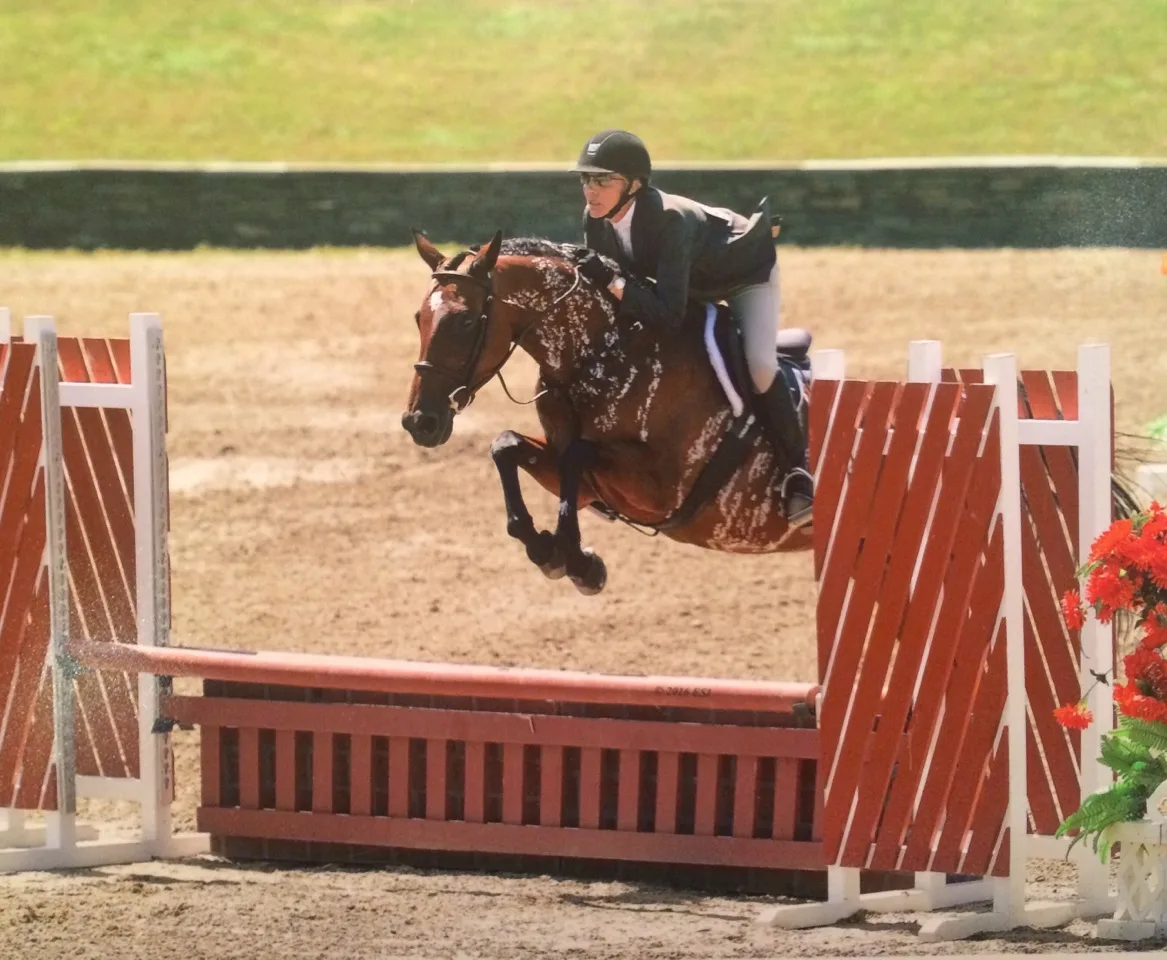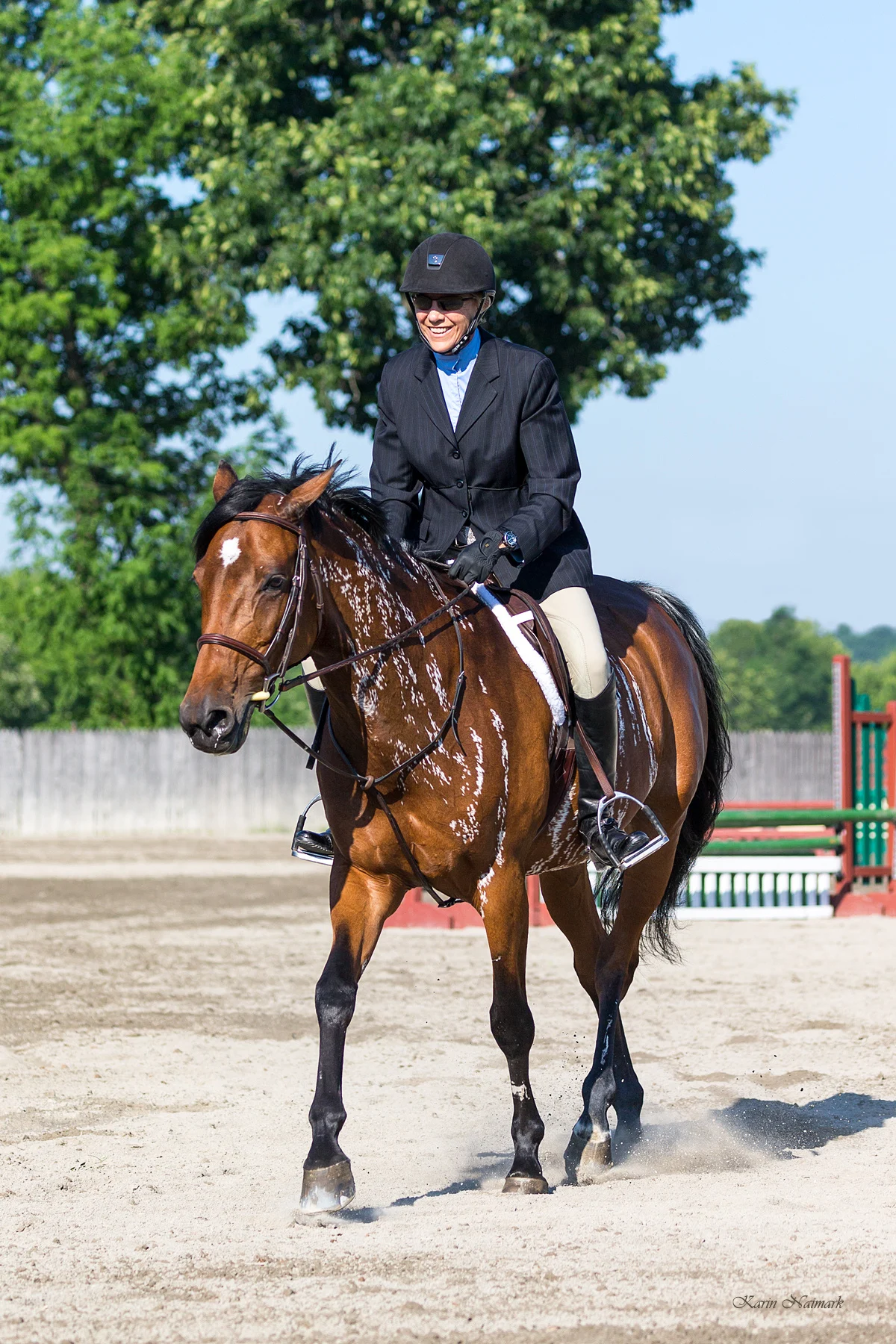Prior to January 2016, Monica Oliver was an adult amateur hunter rider very much like the rest of us. She had her anxieties, and her confidence issues. She was looking forward to the 2016 show season because she had just begun a lease on Queen Of Hearts (aka “Josie”), a Dutch Warmblood mare of coloring so unique that the Chronicle wrote about her in 2013 for her unusual, reverse brindle stripes.
Then, Oliver got a call she wasn’t expecting.
A routine colonoscopy had turned up a polyp which, to the surprise of her doctors, turned out to be cancerous. A subsequent surgery to remove part of her intestine also resulted in the removal of 18 lymph nodes, one of which was also found to have cancerous cells, elevating her disease to stage 3 by default. Oliver found out later that her surgeon had gone beyond the standard number of lymph nodes for removal; if he hadn’t, she may never have known the disease had spread to her lymphatic system and it might have lurked for longer.

Monica Oliver at HITS On The Hudson during her fifth month of chemotherapy. Photo by ESI Photography
Unsurprisingly, everything changed. Oliver went from mapping out her show schedule to arranging her time around 12 biweekly infusions of chemo. She had a port put into her chest. She had to step away from her work as the owner of an executive coaching business to focus on her treatment. Oliver quickly realized the thing she missed most about her life before cancer was riding. Her surgeon, also a horse person, told her in strictest terms she wasn’t to get on a horse for six weeks after the surgery. Six weeks to the day after the operation, Oliver and trainer Sarah Stewart were in the arena with Josie.
“I was supposed to just walk, and I’m like, ‘You know what? That’s kind of lame. Let’s do some trotting,’” said Oliver. “Then, that didn’t feel so good and I thought, ‘Cantering might feel better.’ I just kept pushing it, and it just felt so good.
“That’s when I really began to appreciate the power of endorphins.”
Oliver, now 57, grew up near Arlington Park outside Chicago and as a child would crane to look at the horses as they drove by. It was a tour of the backstretch of the racetrack there that really hooked her, when she got up close to horses for the first time. She grew up taking lessons, and as an adult drifted in and out of regular training and showing as a hunter as her career allowed. Oliver’s lease with Josie had been her chance to continue the more extensive competition schedule she had developed with a prior lease.
ADVERTISEMENT
Whether she was actively competing or not, horses had remained in Oliver’s blood. Not only did her battle with cancer make her more grateful for her time in the saddle, she also firmly believed the endorphins she got from her rides were helping her heal.
Oliver was set for 12 chemotherapy treatments, spaced two weeks apart. She learned quickly that if she got chemo Monday through Wednesday, she would be recovering by Thursday and by Saturday she’d feel well enough to head to the barn. The more treatments she went through, the stronger her time around Josie made her feel.
“It was the only thing that kept me motivated, knowing I could get back on a horse,” she said.
Oliver kept hiking and working with a personal trainer on the weeks she didn’t have a chemo treatment and kept riding full-time those weeks. Within a few weeks of starting chemo, she sat down with trainer Sarah Stewart and wanted to know, ‘What’s the first show I can do?’ Oliver and Josie went to the Garden State Preview (N.J.) six weeks after she started chemotherapy, and went to the Saratoga Springs Horse Show (N.Y.) next, where they were champions in their 2’6″ division. She was also the highest scoring pre-child/pre-adult/low adult competitor in the $10,000 Monmouth at the Team Hunter Derby (N.J.), coming 16th out of 80 in the overall standings.
For Oliver, those were better ribbons than she’d gotten in the past, and she attributed her results in part to a changed perspective on riding. Part of it, of course, was that the show ring couldn’t seem scarier than a Stage 3 cancer diagnosis, so she rode with fewer jitters and consequently suspects she rode better. The other part was sheer determination not to let the disease derail her season.
“It really was, ‘This has really messed up my life, and I’m not going to let it get in my way, so I’m just going to prove to cancer that it’s not going to get to me,’” said Oliver. “Life’s too short. And maybe that feeds into the confidence thing, because I knew I might never have the chance to do this again.”
But Oliver’s revelations go beyond the old truth of a serious illness resulting in a deeper appreciation for life. Her experience as an executive coach helped her better organize her thoughts about her determination to ride as much as possible through cancer. For one thing, she used the disease to identify and quell a lot of the anxieties she had felt before about competing.
ADVERTISEMENT
One of the lessons she teaches as a coach is that of the saboteur and the sage; the saboteur is the negative voice inside everyone trying to convince them they’re destined to fail at their next endeavor. The sage is the source of positive self-talk, and is the part of the brain that wisely sorts out the saboteur’s statements to see which are myths and which are legitimate concerns. Oliver’s experience is the saboteur is usually born from critics a person encounters during childhood.
For Oliver, fighting cancer gave her a better sense of her saboteur and her sage, although that doesn’t mean she hasn’t fought that inner critic since her diagnosis. Oliver and Josie went to the Mid-Atlantic Equitation Festival (Md.) shortly after Oliver had picked up a case of pneumonia so bad it required a tube in her ear. Her balance was off, and she knew it; Josie picked up on her uncertainty and began scooting to the left in front of jumps.
“The saboteur is a real asshole. It is not easy, and it is does come back. It constantly comes back,” she said. “Listen to your sage. I actually picture a sage-like character and picture the saboteur as this ugly creature I’m just going to block out. I guess it is a form of tricking your brain, because your brain can so easily go down that rat hole with that negative stuff.”
Her experience with cancer also made Oliver focus on what it was about riding she really valued, in a way she hopes can help other riders, whether they’ve been through a serious illness or not.
“Focus on what gives you meaning in life,” she said. “Think about what’s most meaningful to you and defining success in those terms. That was the big thing for me—was it really the blue ribbon, or was it being able to go out there and do what I love doing? Health aside, I think that’s an important lesson for anybody.
“If you really think about partnering with this amazing animal, and having the privilege of being able to go out in the show ring and do this, right there, you’re winning,” she added.
Oliver is happy to announce she had a clear CAT scan in April, and has had her chest port removed.









